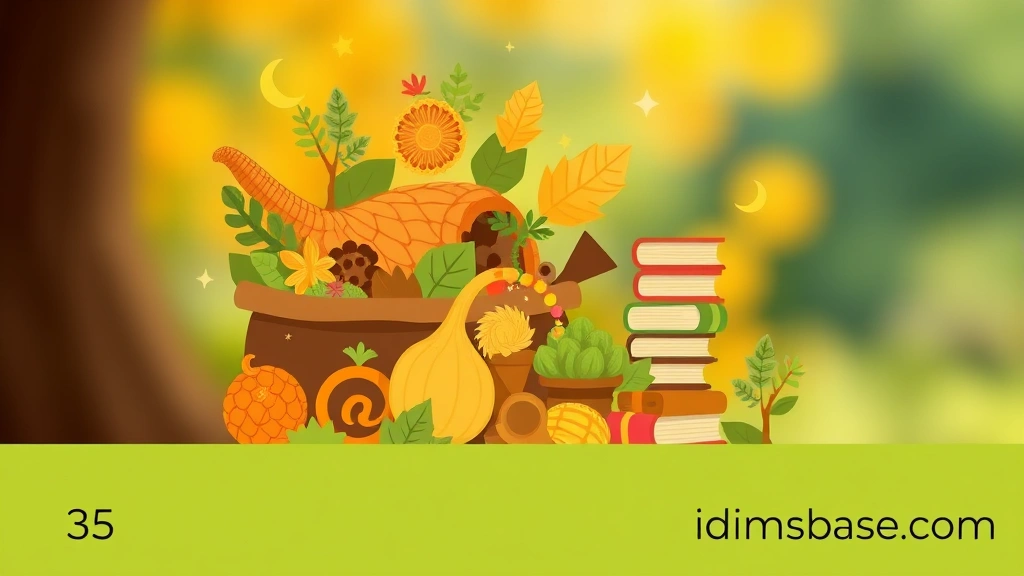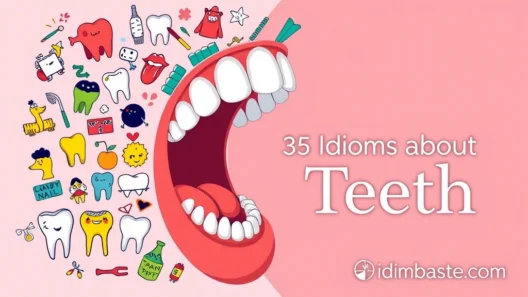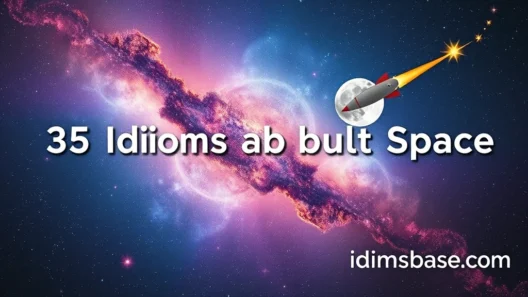Have you ever found yourself searching for just the right words to describe a large quantity of something, only to feel like your vocabulary well has run dry? Perhaps "a lot" feels a bit, well, basic? You're not alone! English is a vibrant language, bursting with colorful expressions, and when it comes to describing abundance, we've got a treasure trove of idioms. These aren't just fancy phrases; they add flavor, nuance, and even a touch of wit to your conversations and writing.
Idioms are fantastic because they often paint a vivid picture, making your communication more engaging and memorable. Instead of simply stating a fact, you can evoke an image or a feeling. And let's be honest, who doesn't love sounding a little more sophisticated and expressive?
In this delightful journey, we're going to explore 35 incredible idioms that mean "a lot." Get ready to expand your linguistic toolkit and impress your friends, colleagues, and even yourself!
Why Use Idioms for "A Lot"?
You might be thinking, "Why bother with idioms when 'a lot' works just fine?" Great question! Here's why you should embrace these linguistic gems:
- Adds Vibrancy: They make your language more dynamic and interesting.
- Shows Fluency: Using idioms naturally demonstrates a higher level of English proficiency.
- Expresses Nuance: Different idioms can convey slightly different shades of meaning – is it a lot of something good, bad, or just neutral?
- Engages Your Audience: They grab attention and make your communication more memorable.
- It's Fun! Seriously, playing with language is one of life's simple pleasures.
Ready to dive in? Let's uncover these fantastic phrases!
35 Idioms for "A Lot"
Here’s your ultimate guide to expressing abundance with flair!

- A Plethora of: This sounds super fancy, right? It means a large or excessive amount of something.
- Example: "The buffet had a plethora of delicious desserts."
- A Multitude of: Similar to "plethora," this refers to a very large number of people or things.
- Example: "A multitude of stars twinkled in the night sky."
- A Wealth of: Often used for non-material things like information, experience, or knowledge.
- Example: "She has a wealth of knowledge about ancient history."
- A Ton of / Tons of: Very common and informal, meaning a very large amount.
- Example: "I have a ton of homework tonight."
- A Mountain of / Mountains of: Implies a huge, daunting amount, often of work or things to do.
- Example: "There's a mountain of laundry to fold."
- Heaps of: Means a lot, often used informally for things that can be piled up.
- Example: "We had heaps of fun at the carnival."
- Loads of: Another informal but very common way to say "a lot."
- Example: "There are loads of people at the concert."
- Piles of: Similar to "heaps of," suggesting a large, unorganized quantity.
- Example: "He has piles of books on his desk."
- Sacks of: Implies a large quantity, often of something that can be contained in a sack (like money or goods).
- Example: "They made sacks of money from their new invention."
- Bags of: Similar to "sacks of," often used for abstract things like trouble or fun.
- Example: "We're in for bags of trouble if we don't fix this."
- Oodles of: A playful and informal way to say a very large amount.
- Example: "The kids had oodles of energy after school."
- Scads of: Another informal term for a large quantity or number.
- Example: "There were scads of tourists in the city center."
- A Great Deal of / A Good Deal of: Used for uncountable nouns, meaning a large amount.
- Example: "He showed a great deal of patience."
- A Large Quantity of: Straightforward and formal, simply meaning a big amount.
- Example: "The factory produced a large quantity of goods."
- A Significant Amount of: Implies a noticeable or important large amount.
- Example: "A significant amount of research went into the project."
- An Abundance of: Means a very large quantity of something.
- Example: "The garden produced an abundance of fresh vegetables."
- A Profusion of: Similar to "abundance," often used for things that grow or appear in large numbers.
- Example: "There was a profusion of wildflowers in the meadow."
- In Droves: Refers to people or animals moving or appearing in large groups.
- Example: "Fans arrived in droves to see the band."
- To No End: Means to an excessive degree or without limit, often used with verbs.
- Example: "She worried to no end about her exams."
- To the Max: Informal, meaning to the utmost or highest degree possible.
- Example: "He pushed himself to the max during the race."
- Through the Roof: Used for prices, temperatures, or numbers that increase to a very high level.
- Example: "The cost of living has gone through the roof."
- Up to Your Eyeballs in: Means to have a very large amount of something, usually work or problems.
- Example: "I'm up to my eyeballs in deadlines."
- Swimming in: Similar to "up to your eyeballs," implies having an overwhelming amount.
- Example: "After his inheritance, he was swimming in money."
- Brimming with: Means full to the very top, often used for emotions or qualities.
- Example: "Her eyes were brimming with tears."
- Chock-full of: Very full, packed with a lot of something.
- Example: "The box was chock-full of old photographs."
- Bursting at the Seams: So full that it seems about to break open, often used for places or things packed with people/items.
- Example: "The stadium was bursting at the seams with excited fans."
- A Whole Lot of: A simple, informal way to emphasize "a lot."
- Example: "We need a whole lot of patience for this task."
- More Than You Can Shake a Stick At: A colorful, informal idiom meaning a very large number or amount.
- Example: "There are more problems than you can shake a stick at."
- To the Gills: Completely full, often used for a container or a person who has eaten too much.
- Example: "The suitcase was packed to the gills."
- Beyond Measure: Means to an extent that cannot be measured; immeasurable.
- Example: "Her kindness was beyond measure."
- In Spades: Means in large quantities; to a great degree.
- Example: "He has talent in spades."
- A Slew of: A large number or quantity of something, often used for problems or negative things.
- Example: "The company faced a slew of lawsuits."
- A Barrel of Laughs: While it specifically means "a lot of laughs," it's a great example of an idiom using a container for abundance.
- Example: "He's always a barrel of laughs at parties."
- A Good Many: Used for countable nouns, meaning a considerable number.
- Example: "A good many students passed the exam."
- No End of: An informal expression meaning a great deal or an excessive amount of something.
- Example: "There's no end of trouble with that old car."
See? That's quite a collection, isn't it? Each one adds its own special flavor. Choosing the right idiom can really elevate your communication, making it more precise and engaging.
Choosing the Right Idiom: A Quick Guide
With so many options, how do you pick the perfect one? Consider these points:

- Formality: Are you writing a formal report or chatting with a friend? "A plethora of" for formal, "tons of" for informal.
- Countable vs. Uncountable: Some idioms work only for things you can count ("a multitude of people"), while others are for things you can't ("a great deal of patience").
- Connotation: Does the idiom imply a positive, negative, or neutral amount? "A barrel of laughs" is positive, "a slew of problems" is negative.
- Context: What are you describing? Work, money, emotions, people? The idiom should fit the context.
Let's put some of these into a handy comparison table to see their nuances:
Idiom Comparison Table
| Idiom | Formality | Countable/Uncountable | Connotation | Common Usage |
|---|---|---|---|---|
| A Plethora of | Formal | Both | Neutral | Information, options, items |
| Tons of | Informal | Both | Neutral | Almost anything |
| A Mountain of | Informal | Both | Often negative | Work, problems, laundry |
| A Wealth of | Semi-formal | Uncountable | Positive | Knowledge, experience, resources |
| Up to Your Eyeballs in | Informal | Uncountable | Negative | Work, debt, problems |
| In Droves | Semi-formal | Countable (people/animals) | Neutral | People arriving/leaving |
| In Spades | Informal | Uncountable | Positive | Talent, luck, something you have a lot of |
| A Slew of | Informal | Countable | Often negative | Problems, complaints, tasks |

Frequently Asked Questions (FAQs)
H4 What is an idiom?
An idiom is a phrase or expression whose meaning cannot be understood from the ordinary meanings of its individual words. It's a figurative saying that has a commonly understood meaning within a particular culture or language. For example, "kick the bucket" doesn't literally mean to kick a bucket; it means to die.
H4 Why are idioms important in English?
Idioms are crucial because they add richness, color, and nuance to the language. They allow for more concise and expressive communication, often conveying complex ideas or emotions in a memorable way. Using idioms can also make your English sound more natural and fluent, as they are a significant part of everyday conversation for native speakers.
H4 Can I use these idioms in formal writing?
It depends on the idiom and the context. Some idioms, like "a plethora of" or "a significant amount of," are perfectly acceptable in formal writing. Others, such as "tons of," "oodles of," or "up to your eyeballs in," are highly informal and best reserved for casual conversation or creative writing. Always consider your audience and the purpose of your writing.
H4 Are there regional differences in idioms?
Absolutely! While many idioms are widely understood across the English-speaking world, some can be more prevalent in certain regions (e.g., British English vs. American English) or even within specific communities. It's always a good idea to be aware of your audience when using less common idioms.
H4 How can I learn to use idioms naturally?
The best way to learn idioms is through exposure and practice.
- Read widely: Pay attention to how idioms are used in books, articles, and online content.
- Listen actively: Notice idioms in movies, TV shows, podcasts, and conversations.
- Practice speaking: Try incorporating new idioms into your own conversations. Start with one or two at a time.
- Keep a notebook: Jot down new idioms you encounter, along with their meanings and example sentences.
- Don't be afraid to make mistakes: It's part of the learning process!
H4 Do all idioms mean "a lot"?
No, not at all! Idioms cover a vast range of meanings, from emotions and actions to descriptions of people and situations. The idioms discussed in this article are specifically chosen because they all convey the idea of "a lot" or "a large quantity."
Key Takeaways
- Expand Your Vocabulary: Moving beyond "a lot" makes your English more sophisticated and engaging.
- Choose Wisely: The best idiom depends on formality, whether you're describing countable or uncountable things, and the overall tone you want to convey.
- Practice Makes Perfect: The more you hear and use these idioms, the more natural they will become.
- Add Flavor: Idioms bring color, humor, and depth to your language, making your communication more memorable.
- Show Fluency: Using idioms correctly demonstrates a higher level of English proficiency.
So, there you have it! A comprehensive guide to 35 fantastic idioms that mean "a lot." We hope you found this exploration as exciting as we did. Now, you have a wealth of options at your fingertips to describe abundance with precision and panache. Go forth and use them in spades! Which one will you try first? Let us know!






